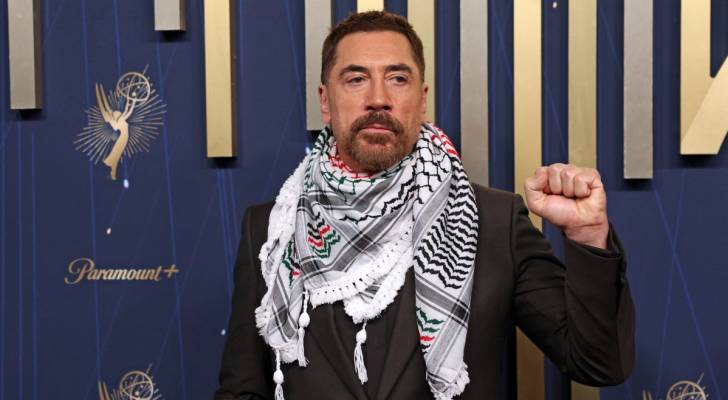Spanish actor Javier Bardem arrives for the 77th Primetime Emmy Awards. AFP
VIDEO: Emmys night sees stars use platform for Palestine advocacy
The 2025 Emmy Awards ceremony became a platform for several celebrities to voice their support for Palestine, drawing both praise and criticism for injecting political statements into the annual television celebration.
The vocal advocacy on the red carpet and during acceptance speeches highlighted the ongoing global debate surrounding the Israeli Occupation of Palestine.
One of the most prominent moments came from Hannah Einbinder, star of the HBO Max series Hacks. While accepting an award, Einbinder concluded her speech with a three-part statement: "Go Birds, f*** ICE, and free Palestine."
Her direct call for "free Palestine" quickly went viral, igniting widespread discussion online. Einbinder has been a consistent critic of 'Israeli' policy, previously stating that her condemnation of 'Israel' is "antithetical to our deepest Jewish traditions" and that she is "horrified by the 'Israeli's' massacre of well over 65,000 Palestinians in Gaza.
Einbinder was not alone in her advocacy. On the red carpet, several attendees were seen wearing artist-designed pins for Artists4Ceasefire, a collective advocating for an end to the violence in Gaza.
The pins, featuring a hand with a black heart, have become a visible symbol of solidarity with Palestinians at major awards ceremonies.
Additionally, actor Javier Bardem, best known for his role as Anton Chigurh in No Country for Old Men (2007), wore a keffiyeh-patterned pocket square, a traditional Palestinian scarf that has become a powerful symbol of Palestinian nationalism and solidarity.
And when asked whether he would work with a company that is in business with 'Israel', Bardem said that he "can't work" with any film or television company that "justifies or supports the genocide."
The politicization of the Emmys follows a trend seen at other major awards shows this year, including the Oscars and the Grammys, where calls for a ceasefire and support for Palestine have become increasingly common.
This growing trend underscores how cultural events are becoming significant arenas for public discourse on global political issues.




